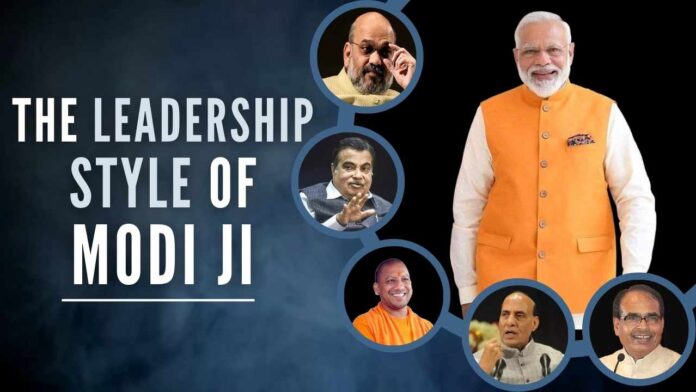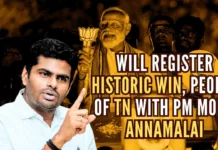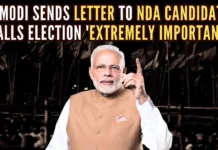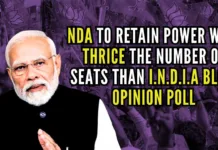
Decoding leadership of Narendra Modi
Immediately after the Independence Day 75th Anniversary celebrations, the BJP Parliamentary Board (BJP-PB) and BJP’s Central Election Committee (BJP-CEC) were restructured.
Some significant changes are the dropping of Nitin Gadkari and Shivraj Singh Chouhan from BJP-PB, and Shahnawaz Hussain from BJP-CEC. A significant non-inclusion is that of Yogi Adityanath in BJP-PB. No CM has been included in it.
Chouhan’s exclusion may be explained as non-performance, but Gadkari’s and Yogi’s cases are unexplained. Shahnawaz Hussain’s dropping could be due to serious charges against him in courts. This article is not about who should be on these lists and who should not be.
One of the complaints against Modi has been that he has kept most of the powers in the government and the party to himself since he came to power in 2014. The latest changes within BJP reinforce this complaint, which causes concern.
It’s another matter of whether a place in BJP-PB or BJP-CEC means anything at all. All key decisions are anyway taken by Modi, perhaps in some form of consultation with his close advisors, and simply endorsed by these bodies. In the last 8 years, we haven’t heard much about these bodies, except when changes are made in their membership.
Let’s look at things from Modi’s angle. What may be the reason(s) why he may be centralizing most of the power? Though there may be no major charges of high-level corruption, nepotism, misuse of power, etc, against BJP leaders, it is not that they are all clean. Just that the degree of accusations against them (compared to opposition leaders) may be much less, because of the centralization of powers with Modi.
Coming back to dropping Nitin Gadkari and non-inclusion of Yogi in BJP-PB, this has raised eyebrows. The broad reasons appear to be that, they have a significant pan-India persona of their own, as revealed by the MOTN (Mood Of The Nation) poll conducted by India Today.
Gadkari is also close to RSS.
To the question: Who is the best performing minister in the Modi government?’, 23% of the respondents said Gadkari, 20% said Rajnath Singh, and 17% said Amit Shah. Rajnath Singh may be untouched because he may not have wanted to let all go in one stroke. Amit Shah may be there because he’s permanently in Modi’s inner circle.
Yogi doesn’t top the list of CMs in popularity, either overall, or even within BJP-ruled states, but his popularity rating in UP and across India is quite high.
To the question: Who is the best suited within BJP to succeed Modi as PM?’, 25% of the respondents said Amit Shah, 24% said Yogi, 15% said Gadkari, and 9% said Rajnath Singh.
Gadkari is always full of big path-breaking ideas, has been able to mobilize a lot of money for infrastructure, is a go-getter, and has friends across parties though he has never let it come in the way of following party discipline. He is a great asset to the government, though, on the issue of being clean, he is not comparable to Modi and Yogi. He could be used even better.
Since Yogi has no family of his own and has a clean record when it comes to personal probity, he has been given a fair level of freedom in decision-making in UP. This may have been the original reason for choosing him to be UP’s CM.
No one comes anywhere close to the persona of Modi, and so Gadkari and Yogi are no challenge to Modi, but they could be threats to Amit Shah later, if at all. So, the question arises if Gadkari and Yogi are not in the BJP-PB to help Amit Shah occupy the perceptional position of No 2 in BJP.
In principle, good leaders groom even better leaders, giving an opportunity to all next-rung leaders a fair opportunity to prove their mettle even during their tenure. They recognize and reward leaders working with them. They command respect through personal influence processes, not by subservience. They leave behind even better leaders to succeed them. This is how leadership in BJP can make continuous improvements within. Being a party with a difference, this should apply to BJP more than to any other party.
Modi is one of the best PMs India has had, if not the best. As a good leader, he should create healthy cooperative competition within his government and party. He should maintain a level playing field among his next rung of leaders to emerge when the time of succession comes.
Already BJP suffers from a lack of sufficient leaders with competence and experience in governing the nation, as BJP has been in power for only 14 out of 75 years since independence.
If Modi has won the popularity of the people and retained it for a fairly long time (the caveat being ‘in a first past the post system, not in absolute majority terms), the support and good work of the next rung of popular leaders like Yogi and Gadkari played a major role. So, Modi should not give the perception of cutting them to size.
Regardless of any justifications for centralization of power, Modi is increasingly getting to be lonely at the top, within his own party and the government. He keeps even his close circle of advisors at a distance. Such over-centralization and inbreeding (consulting a select set of advisors) is no way to excel in governance.
Leaders who isolate themselves end up in echo chambers, and their decisions may not be anywhere close to the best possible. Modi could have avoided the mistakes his government made like the imperfect implementation of demonetization, withdrawal of farm laws, failure to create jobs, etc if he had held wider open consultation at least within a wider and more competent section within the party and the government on all government party actions.
Lest I’m misunderstood, I should give credit where it is due. Despite having been a centralizer of power, with all the limitations it imposes, Modi has delivered a lot to the nation in many realms.
One major example of his accomplishments is the way abrogation of Article 370 was done and implemented, limiting freedom during the initial stages but within tolerable limits, delimitation of constituencies, now giving voting rights to non-Kashmiri Kashmir residents, and the step-by-step method in which he is on his way to liberating Kashmir from the clutches of Kashmiri political leaders who have directly and indirectly propped up militancy. Though there is some pain in the process, no one else could have done it better.
Yet, we want the very good Modi Ji to be still better. So, I hope he changes his world view, decentralizes power more, with some controls, and grooms his second rung leaders giving all competent leaders equal chance to be his successor, so India will continue to have good leadership even after Modi.
The more successful one is in following a certain worldview, the more difficult it will be for the person to change one’s way. Modi, at 71, has so many years of experience in public space and public administration at the highest level, that he is unlikely to change. But yet, how I wish he changes to be an even better Modi.
Note:
1. Text in Blue points to additional data on the topic.
2. The views expressed here are those of the author and do not necessarily represent or reflect the views of PGurus.
PGurus is now on Telegram. Click here to join our channel and stay updated with all the latest news and views
For all the latest updates, download PGurus App.
- How BJP can get 33%+ vote share in TN - April 1, 2024
- A transparent, equitable electoral funding alternative - March 19, 2024
- How TN BJP can come to No. 1 or No. 2 in 2024 LS polls - January 11, 2024











Majority of commentators have had no experience of running an organization, big or small with total authority. Running tight and happy ship requires ability to command respect and confidence. This come to forth only in difficult times, why wasn’t Modi thrown out despite de-mo, roll back of the land reforms, Pandemic and agri-bill. Ability to self-correct comes only when there is no self-interest. Choosing the team is an art when done in the interest of the party for future leadership and continuity. Self propagation by and large is often seen as a inclination towards vested interest and an unhealthy attitude. When Modi is bringing in the success he gets the credit, if he fails he will take the rap as well, something that cannot happen in family run parties. So long as there is no evidence of vested interest, he will be given a free hand. His uncompromising approach towards probity in public life and self-discipline dose make many uncomfortable, who might try to express it in different ways, but he is smart enough to offer them an option with a lesson. His succession plan will surly have the probity vision, capability, articulation and discipline as main virtues, not sycophancy or old relations or good PR. Unfortunately we have had no leader in the past with all these qualities so he could look for them in the succession.
Please see the hangout of Sree Iyer with Shekarji on 8/23/22 in PGuru youtube channel. He has a different take.
There is a belief in the inner circle of Modi that there are some vested interested within the BJP/ruling dispensation that might have a role in the demonitization/ CAA/ farm law debacles.
During the 75+ years the deep-state has taken deep roots in all institutions. Identifying and rooting them out is not an easy task.